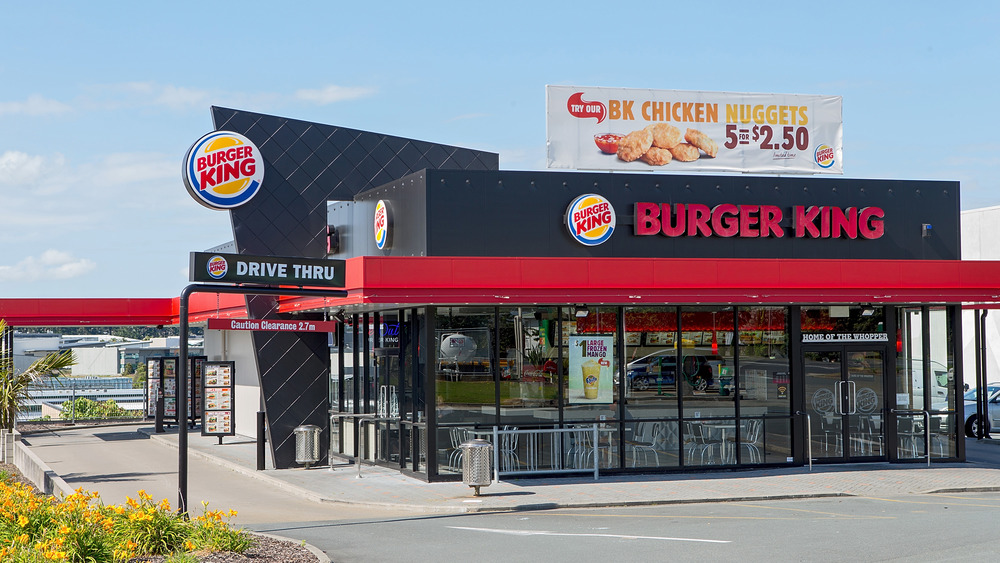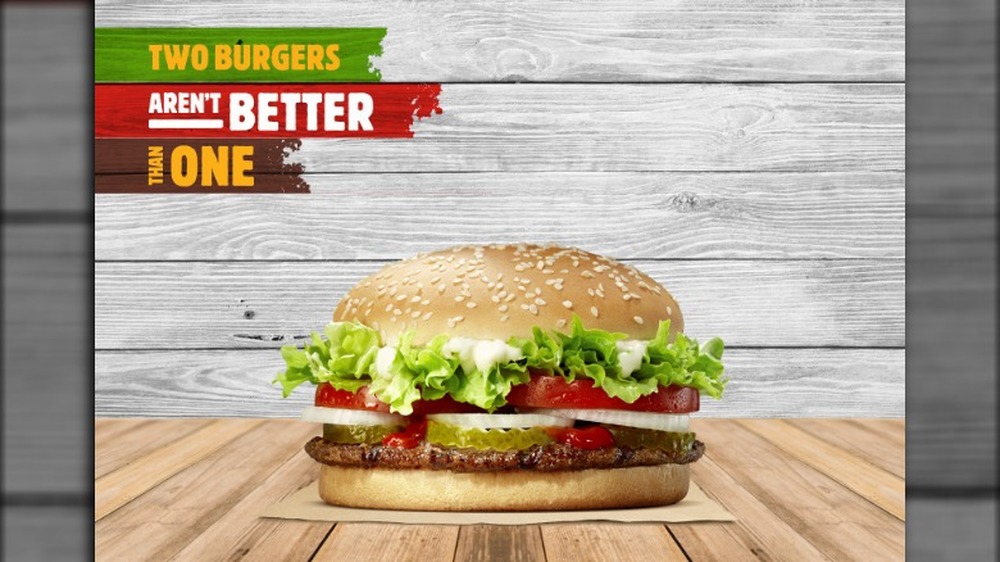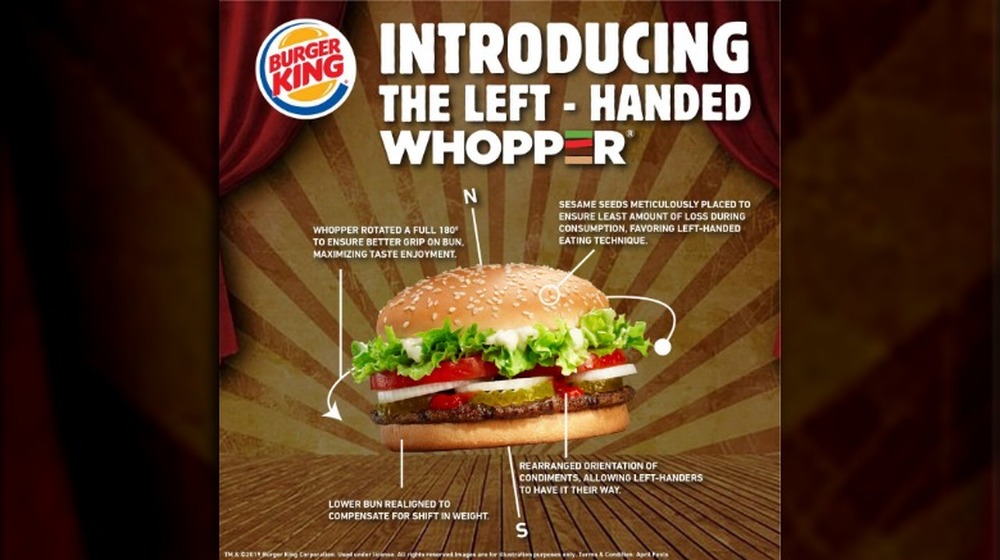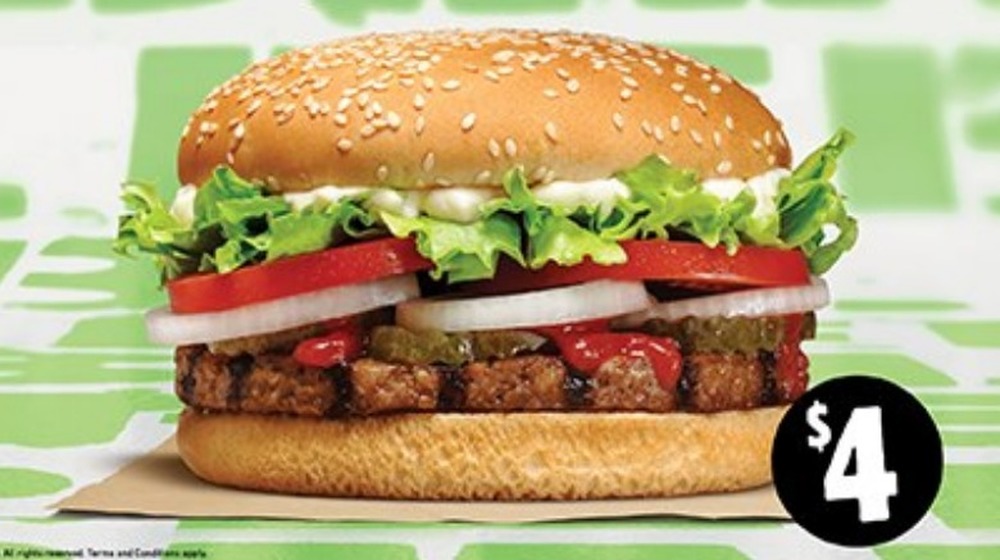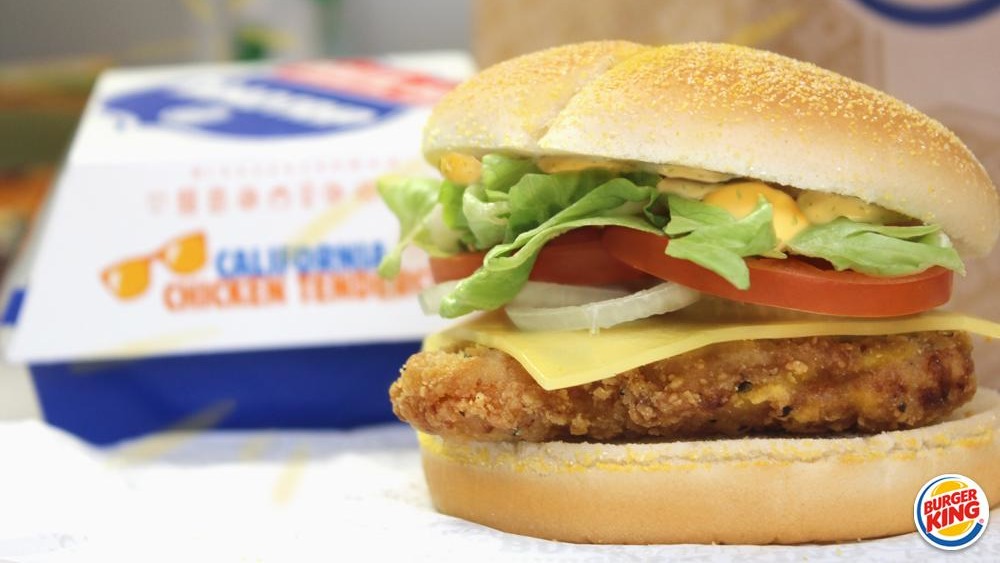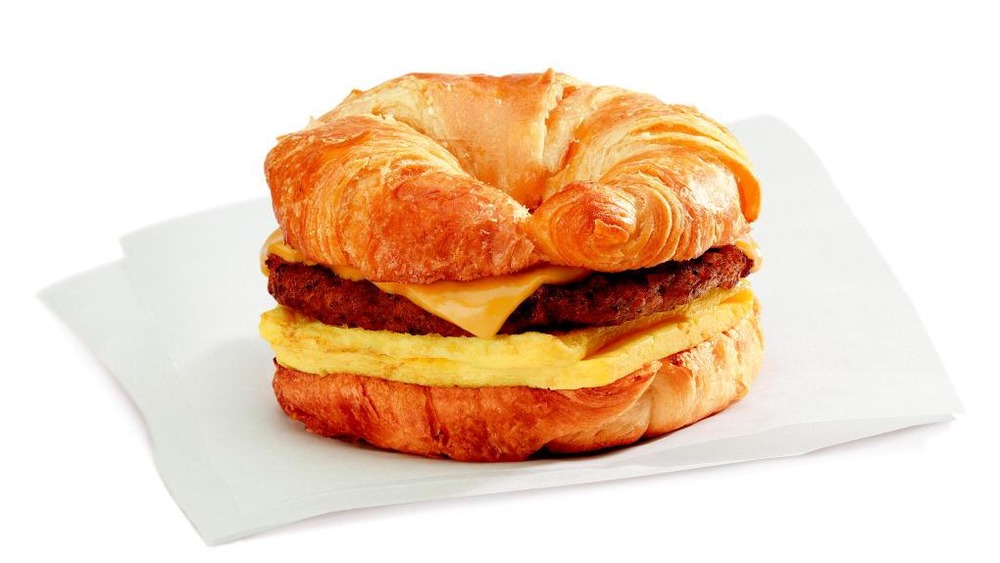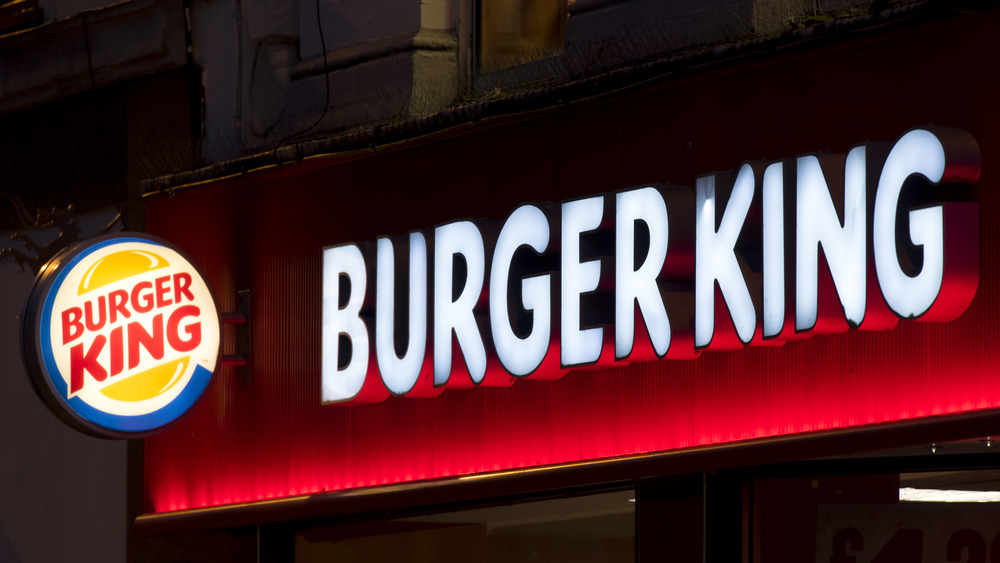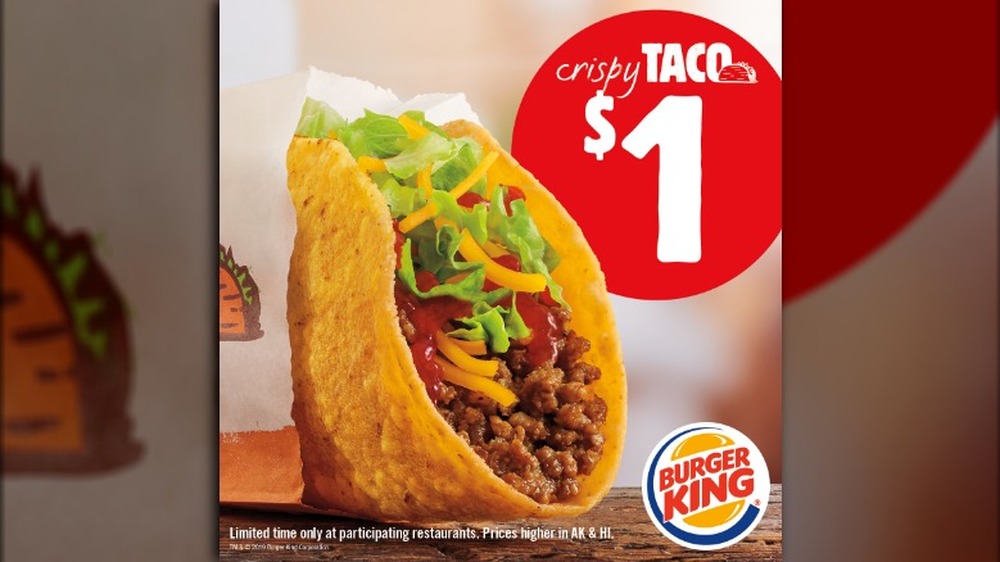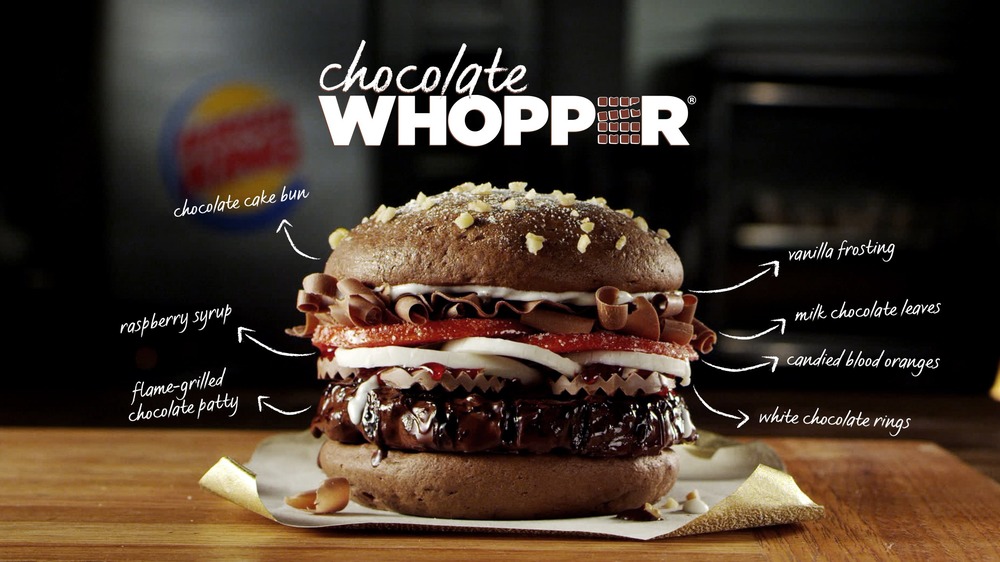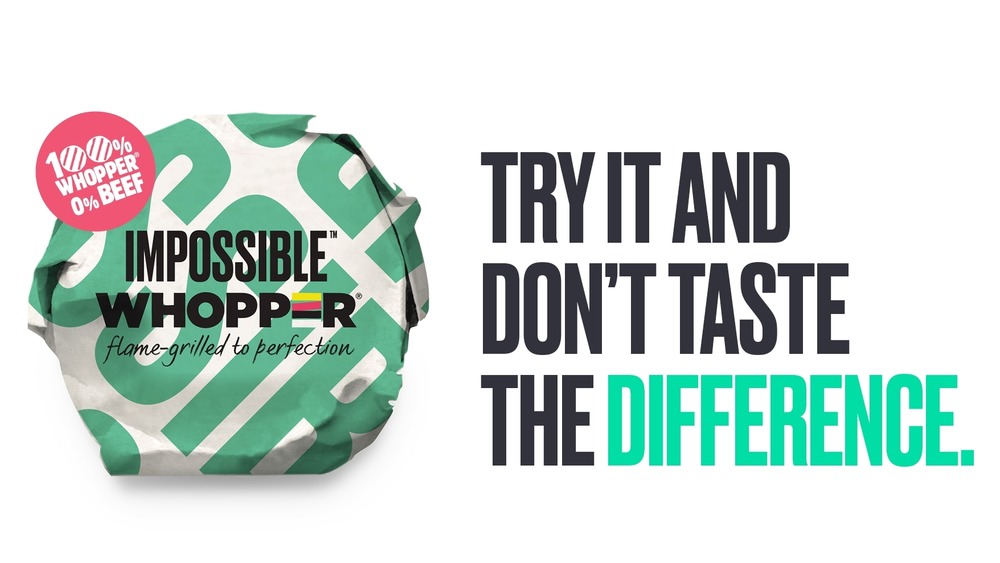Times Burger King Lied To Your Face
The human story is a tale that's littered with bluffs, fibs, and deceit. For instance, History Today recounted that a 15th-century dude named Perkin Warbeck actually married into the Scottish royal family by pretending to be Richard of York, an English prince. And in 2010, Liam Hemsworth told CTV News that he'd falsely claimed that he could play volleyball as a means to star in The Last Song. Furthermore, TED declared that we all receive between ten and 200 pieces of incorrect information per day. Yup, the history of planet Earth has starred many a different sham.
However, while outlining every lie that's ever happened could be interesting, it would also take a wildly long time. So instead of doing that, let's zero in on a single entity that's told some jaw-dropping doozies. Hopefully, this exercise will help us scrutinize the world through a more thoughtful and discerning lens.
But is there an entity that's been called out for being dishonest enough times that we could analyze their folly? Yes, there are a multitude of them! Nevertheless, right now we'll be focusing on Burger King. That's right, the fast food chain. Because this corporation has been frankly untruthful on a ton of occasions. In fact, they've been busted so many times that we're about to explore the depths of their known fakery.
Burger King South Africa fibbed about their cooking process
In 2019, Business Insider reported that the South African takeaway outlet Steers wasn't stoked with a Burger King ad. In the commercial that they took issue with, BK exhibited its patties being cooked above an open flame, using a method known as braaing. Steers didn't like this image, as Burger King doesn't cook their burgers that way, while they do. This joint decided to take their issue to the Advertising Regulatory Board.
Now, the above-mentioned board investigated Steers' claim and discovered that Burger King broils its patties using gas burners. Ergo, this restaurant doesn't braais them. The board also stated that Burger had told them that this grilling method creates items that aren't at all different from braaied ingredients. This regulatory body disagreed with the King's assessment and told their members not to show the inaccurate food advert. They expressed, "The fact that there is some contact with a flame, inside a gas broiler system, does not satisfy the expectations of open flame grilling as portrayed in the advertiser's commercial."
Burger King made up The Left-Handed Whopper
Not all lies are terrible. Case in point, some April Fools jokes can be pretty funny. And according to the Herald-Journal, Burger King played a massive prank on the first day of this month back in 1998. This establishment had published a one-page spread in USA Today that asserted they'd debuted "The Left-Handed Whopper." In the ad, they professed that their burger had the classic's ingredients, but everything in it was turned around 180 degrees. The King's fake promo remarked that they released these Whoppers to reward its patrons that weren't right-handed or ambidextrous.
Moreover, the Herald-Journal went on to outline that this story didn't stop there. On the second of April, BK disclosed that The Left-Handed Whopper wasn't real. But by that point, the damage had already been done, and thousands of people had tried to order the item.
It's also worth noting that in 2019, Burger King Fiji pulled the same prank. On Facebook, they announced, "Introducing a Left-handed WHOPPER specially designed for left-handed people!" But unlike last time, they were less subtle that this announcement was a stunt. In the fine print of their advertisement, they had written the words, "April Fools."
Burger King New Zealand lied in a Rebel Whopper commercial
Near the start of April in 2020, New Zealand's Advertising Standards Authority determined that a Burger King ad was misleading. But what did this fast food joint do incorrectly? Well, they stated in a radio commercial that their plant-based Rebel Whopper was "100 percent Whopper, zero percent beef." This tag line might lead one to assume that these burgers are vegetarian- or vegan-friendly when they're absolutely not. In actuality, the Rebel Whopper's patties are grilled on the same surface that the restaurant cooks their meat. This means that some of these items will contain animal products.
Before the Advertising Standards Authority decided that Burger King's commercial could mislead folks, the eatery claimed that they believed their ad hadn't confused most people thus far. They insisted, "The radio advertisement states that the product is plant-based but does not claim to be vegetarian. The statement 100 percent Whopper, 0 percent Beef is used to reference the fact that the burger is made with the same ingredients that Burger King's signature Whopper is made with but that the patty is 100 percent plant-based." Nevertheless, Burger King also declared that they'd respect the board's decision, and the group terminated the advert.
Burger King was dishonest about their 'A.I.-scripted' ads
At this point in time, artificial intelligence can do a lot of mind-blowing stuff. In 2017, Carnegie Mellon University noted that a program called Libratus beat four professional poker players in a No-Limit Texas Hold'em competition. And in April of 2018, Science Robotics published a paper that revealed several researchers had created an IKEA chair-building robot. So, when Burger King attested in a press release from September of 2018 that an ad campaign of theirs was written by an algorithm, this declaration didn't come out of the cultural blue.
However, while Burger King's press release alleged that an ad campaign of theirs was made by an A.I, The Verge asserted that this wasn't entirely true. The publication pointed out that Marcelo Pascoa, the King's global head of brand marketing, had informed AdAge that some parts were composed by people. He said, "Artificial intelligence is not a substitute for a great creative idea coming from a real person." Therefore, Burger King's media announcement hadn't been completely truthful.
Burger King UK exaggerated the size of a menu item
Sometimes, a menu item is bigger on the small screen than it is in a pair of hands. And The Sydney Morning Herald reported that Britain's Advertising Standards Authority definitely found this to be the case in 2010. During July of that year, a couple of people complained to the organization that a Burger King ad had exaggerated the size of the joint's Tendercrisp chicken burgers. The Advertising Standards Authority then decided to investigate the claim and purchase three of these items.
After this group had bought its Tendercrisp chicken burgers, they decided that their purchases were tinier than the one plugged in BK's commercial. The Advertising Standards Authority specified that they contained fewer ingredients, weren't as tall, and appeared smaller in an "average-sized" man's hands than the advert demonstrated. They stated, "We concluded that the visuals in the ad were likely to mislead viewers as to the size and composition of the product."
At some point in this ordeal, Burger King stood by their advert. They argued that their promo's Tendercrisp chicken burger appeared as it did in order to exhibit everything inside the item's bun. So, did Burger King's assertion save their critiqued commercial? Nope, it did not. The Advertising Standards Authority determined that they couldn't play this clip again without changes.
Some Burger King's Croissan'wich coupons were shams
According to the Cambridge Dictionary, a coupon is "a piece of paper that can be used to get something without paying for it, or at a reduced price." Thus, a "coupon" that makes something more expensive isn't truly a coupon. It's instead a piece of paper that might exploit an uninformed customer. And in 2017, the Miami Herald said that Burger King had released such a bogus coupon.
In May, the publication communicated that a Maryland woman named Koleta Anderson filed a lawsuit against Burger King. In it, she claimed they'd created Buy One, Get One Free Croissan'wich coupons that were rip-offs. Anderson alleged that on the 12th of March, she paid $3.19, pre-tax, for a pair of Sausage Croissan'wiches whilst employing a voucher. However, a minute later, she paid $2.16 for a single of these items. Furthermore, the Miami Herald, Anderson, and an investigator hired by Anderson's lawyer were all able to secure analogous bad deals when using Croissan'wich coupons at other Burger King locations.
Five months later, the Miami Herald described that Burger King had settled this case. The chain admitted that they'd released coupons that could short-change its customers if they modified a Croissan'wich order, but they also contended that this error was an anomaly. BK said that they'd pay Anderson $500 and cover her $185,000 worth of attorney's fees. This company likewise agreed to provide $5.00 to any person with a coupon that contained a discrepancy.
Several Burger Kings in China sold expired food
In July of 2020, CGTN published an article about how China Central Television's consumer rights show 315 had revealed that multiple Burger Kings had sold out-of-date food. The program stated that a number of this corporation's restaurants had wrongly updated the expiry date on the bread that they served. Moreover, these eateries supplied their patrons with old chicken nuggets and unsafe pieces of meat. A worker at one of these stores noted, "We change the label directly and the boss would ask you to change it."
After this broadcast aired, Global Times communicated that Burger King had taken to the social media app Weibo to say sorry for what its stores had done. In their response, they wrote, "It is our management that has betrayed the trust of the majority of consumers in Burger King, for which we deeply apologize." Burger King also expressed that they'd shut down these eateries, conduct a self-examination, and would be cooperative if the government investigated this state of affairs.
In August of that year, the Associated Press detailed that the operator of the Burger King locations that were discussed on state TV had been financially penalized. This individual had to pay a fine that exceeded $100,000 and provide the Nanchang Market Supervision Bureau more than $400,000 worth of "illegal income." In total, the Burger King operator turned over $539,600.
Burger King's 2019 Crispy Taco pics were deceptive
Burger King isn't the king of tacos. In fact, when this joint menued these items in 2019, Business Insider purchased some and weren't star-struck by their second undertaking in ten years. The briefing articulated that BK's tacos not only tasted unimpressive, but they also looked astoundingly different from the ones in the eatery's promo pics. Business Insider said, "If you go into Burger King with the expectation that what you saw in promotional photos for the Crispy Taco will resemble what you'll get in real life, it's likely you'll be disappointed and confused."
So, what were the noticeable differences between King's picture-perfect tacos and the everyday items this publication ate? Well, in an advertisement for this menu item, the item's shell is sturdy, packed with ingredients, and contains pieces of cheese. It also looks nothing like the photo Business Insider took of their BK taco. In the write-up, they critiqued their purchase and remarked, "It's maybe one-fourth as thick as its advertised counterpart. It's colorless, and there's no visible beef. The shell is also warped, and the cheese is melted." This chain, consequently, had been untruthful in their ad, in our eyes.
Burger King promoted fictional chocolate Whoppers
Burger King has executed more than one April Fools prank in its time. Back on the 31st of March in 2018, this organization tweeted out a video that announced that they might release a chocolate Whopper. These fake burgers were to be made of house flame-grilled chocolate patties, raspberry syrup, white chocolate rings, candied blood oranges, milk chocolate leaves, and vanilla frosting inside of chocolate cake buns. The King's fake ad ends with a voice-over saying, "Chocolate Whopper. Coming soon, maybe."
These chocolate Whoppers never debuted in America, thus affirming that Burger King's announcement was just a joke. TIMES even mentioned this prank item in its round-up of the best 2018 April Fools jokes. But be that as it may, in 2020, HYPEBEAST detailed that Burger King Taiwan had gone ahead and released a Hershey's Chocolate Whopper. This real burger had different ingredients from the gag meal, nor was it entirely sweet. HYPEBEAST noted that these products contained a beef patty that was covered in Hershey's Chocolate sauce and peanut sauce.
A Brooklyn-based Burger King lied about its Impossible Whoppers
In 2019, Eater reported that a Burger King in Brooklyn had been claiming it sold meatless Impossible Whoppers, when in actuality, this restaurant had been giving its patrons regular Whoppers. A vegetarian had consumed two of this restaurant's mislabeled items after getting them delivered to him, only to discover in-store that what he had ordered wasn't available in his city. "I was incredulous," he told Eater. "It's maybe 20 percent poisoning. This is a city where there are a lot of reasons why people don't eat [meat], from religion to health to ethics."
A manager at this Burger King alleged that they'd informed the delivery person when they swapped Impossible Whoppers for regular Whoppers in a takeaway order. They also submitted that they'd ask the driver to pass along this information. However, the patron that talked with Eater said he and some other customers had never received a single warning. Furthermore, a receipt he'd received declared that his burger was an Impossible Whopper.
When Eater asked Burger King about this situation, a spokesperson's statement contended that a "technology error" allowed the Brooklyn-based restaurant to list this unavailable item. The message also commented, "We apologize for any confusion this has caused." Later that same year, Business Insider publicized the fact that Impossible Whoppers aren't normally technically vegetarian when they're sold at Burger King.
